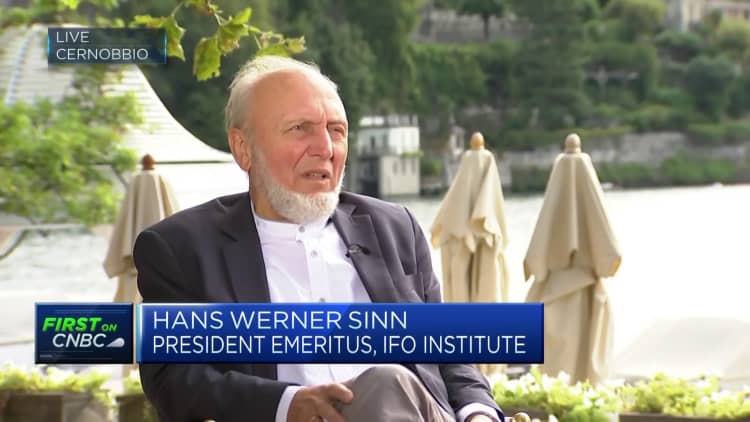 Authorities in Egypt recently allowed the local currency’s exchange rate versus the U.S. dollar to decrease by more than 60%. Additionally, the central bank raised interest rates by 600 basis points. Both steps were key conditions set by the IMF which Egypt had to meet before the approval of a new financial aid package. IMF […]
Authorities in Egypt recently allowed the local currency’s exchange rate versus the U.S. dollar to decrease by more than 60%. Additionally, the central bank raised interest rates by 600 basis points. Both steps were key conditions set by the IMF which Egypt had to meet before the approval of a new financial aid package. IMF […]
Source link
IMF
The IMF has also warned that AI could further broaden income and wealth inequality among countries. AI benefits and challenges would be key points of discussion at World Economic Forum (WEF) meeting in Davos.
The International Monetary Fund (IMF) issued a cautionary statement, indicating that the proliferation of artificial intelligence (AI) could impact nearly 40% of jobs worldwide. The assessment, released on Sunday from the Washington D.C.-based institution, highlighted that high-income economies face more significant risks compared to emerging markets and low-income nations.
The IMF, led by Chief Kristalina Georgieva, emphasized the potential exacerbation of overall inequality due to AI technology and urged policymakers to address this concerning trend. Georgieva stressed the importance of proactive measures to prevent AI from escalating social tensions. The IMF chief also stressed:
“We are on the brink of a technological revolution that could jumpstart productivity, boost global growth and raise incomes around the world. Yet it could also replace jobs and deepen inequality”.
According to the International Monetary Fund, approximately 60% of jobs in high-income nations could see the integration of artificial intelligence. Around half of them are likely to experience enhanced productivity due to AI adoption. In contrast, the exposure to AI impact is projected to be 40% in emerging markets and 26% in low-income countries, respectively.
The IMF’s findings suggest that emerging markets and low-income nations may encounter fewer disruptions from AI in the short term. The report highlights that many of these countries lack the infrastructure and skilled workforce to immediately harness the benefits of AI, thereby raising concerns about the potential for increased inequality resulting from technological advancements.
AI Can Exacerbate Income Inequality, Says IMF
The International Monetary Fund (IMF) has issued a cautionary note about the potential impact of artificial intelligence (AI) on income and wealth inequality within countries, highlighting the risk of “polarization within income brackets.”
The IMF report emphasizes the possibility of workers benefiting from AI experiencing increased productivity and higher salaries, while those unable to access these advantages may face a widening gap.
This concern aligns with previous warnings from Goldman Sachs, which estimated that generative AI could impact up to 300 million jobs globally. However, the Wall Street bank acknowledged that AI technology has the potential to drive labor productivity, economic growth, and boost gross domestic product by as much as 7%.
The release of the IMF report coincides with the World Economic Forum (WEF) meeting in Davos, Switzerland, where global business and political leaders are convening. The WEF event, themed “Rebuilding Trust”, focuses on open and constructive dialogue between policymakers, business leaders, and civil society. The benefits and challenges of AI are likely to be a central topic of discussion at Davos, as leaders address the evolving landscape of technological advancements. The annual event has faced criticism in recent years for perceived shortcomings in relevance and effectiveness.
next
Artificial Intelligence, News, Technology News
You have successfully joined our subscriber list.
Kristalina Georgieva, Managing Director of the International Monetary Fund (IMF), speaks to the media following talks at the Chancellery on November 29, 2022 in Berlin, Germany.
Carsten Koall | Getty Images News | Getty Images
Structural reforms in Germany are needed given the current global economic headwinds, International Monetary Fund Managing Director Kristalina Georgieva told CNBC’s Joumanna Bercetche.
“If you look at the policy decisions Germany is taking, they are around stimulating structural change. And of course, like any other country, structural reforms are a must in this more uncertain world with low gross growth prospects,” Georgieva said Wednesday.
The comments come amid discussions about whether Europe’s biggest economy is once again the “sick man of Europe,” with Germany anticipated to be the only major economy to contract in 2023.
The auto industry should be a particular focus for reform in Germany if the country wants to increase productivity, according to Georgieva.
“For Germany, this is very visible in the need to restructure the automobile sector for this economy of tomorrow,” she said.
The remarks echo those made by Hans-Werner Sinn, president emeritus at the Ifo Institute, at the Ambrosetti Forum in Italy in September. He said Germany regaining the “sick man” title “has to do with the automobile industry, which is the heart of the German industry and many things hinge on that.”
Autos and auto parts were Germany’s biggest export last year, accounting for 15.6% of the value of goods sold abroad, federal statistics office data shows. However, the sector is having a tough time, with both car production and exports weakening as consumers rein in spending amid soaring interest rates on borrowing, high inflation, and recession fears.

The IMF predicts a “mild recession” for the German economy this year, according to Georgieva, but is “fairly confident” it will come out of it as the energy price shock and inflation wane.
“Those are both one-off[s], they’re going to go away,” she said.
Electricity and gas prices hit record highs across Europe in 2022 after Russia’s invasion of Ukraine, but have since come down dramatically. The energy crisis is now “more or less solved,” according to Bundesbank President Joachim Nagel, who spoke to CNBC on the sidelines of the IMF Spring Meetings in April.
Preliminary figures for Germany showed that price rises slowed more than expected in September, with inflation — harmonized so it can be compared to other EU countries — rising 4.3% from a year before. The number was the lowest monthly figure since Russia’s full-scale invasion of Ukraine.
‘Remarkable’ global resilience
The IMF chief also commented on the global picture, saying the resilience of the world economy had been “remarkable.”
“We have avoided a recession that we so much feared may be coming our way this year,” Georgieva said, with labor markets fairly tight and consumer demand remaining strong in most countries. But this recovery is “slow and uneven,” she added.
The U.S. is the only large economy that has “fully recovered” from the post-pandemic economic shock, Georgieva said, while the euro zone remains 2% below its pre-Covid trend. Emerging markets and low-income countries are lagging further behind, down 4%-5% and 6% respectively, according to the IMF.
The fund describes its global growth forecast as anemic, with an average growth level of 3% over the next five years. Pre-pandemic, growth was around 3.8% over the previous decade.

The International Monetary Fund (IMF) has reiterated its calls for crypto regulation across certain countries but said an outright ban may not be the best approach.
In a June 22 report on Latin America and the Caribbean, the IMF pointed to various approaches taken by local governments in addressing the adoption of cryptocurrencies and central bank digital currencies, or CBDCs. Bitcoin (BTC) has been accepted as legal tender in El Salvador since September 2021, while the Bahamas was the first country to launch its own CBDC, the Sand Dollar, in October 2020.
The IMF said Brazil, Argentina, Colombia and Ecuador — whose governments’ regulation of crypto was “in progress” — ranked among the highest countries in the world for the adoption of digital assets in an effort to help the unbanked, send faster and cheaper payments, and more. In addition, according to the fund, most central banks in the region “have or are considering adopting digital currencies.”
Related: IMF envisions ‘new class’ of cross-border payment platform with single ledger
“If well designed, CBDCs can strengthen the usability, resilience, and efficiency of payment systems and increase financial inclusion in [Latin America and the Caribbean],” said the IMF. “While a few countries have completely banned crypto assets given their risks, this approach may not be effective in the long run. The region should instead focus on addressing the drivers of crypto demand, including citizens’ unmet digital payment needs, and on improving transparency, by recording crypto asset transactions in national statistics.”
The IMF has often made public statements in opposition to countries adopting cryptocurrencies as legal tender. On June 19, its director of the monetary and capital markets department, Tobias Adrian, proposed a payment system that used one ledger to record CBDC transactions — an idea that received harsh criticism from many in the crypto space.
Magazine: Are CBDCs kryptonite for crypto?




